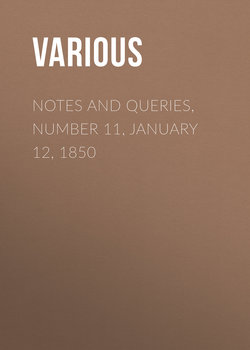Читать книгу Notes and Queries, Number 11, January 12, 1850 - Various - Страница 5
PLAGIARISMS, OR PARALLEL PASSAGES
ОглавлениеI have placed this title in my note-books, more than one instance of similarity of thought, incident, or expression that I have met with during a somewhat desultory course of reading. These instances I shall take the liberty of laying before you from time to time, leaving you and your readers to decide whether such similarity be the effect of accident or design; but I flatter myself that they may be accepted as parallel passages and illustrations, even by those who may differ from me in the opinion I have formed on the relation which my "loci inter se comparandi" bear to each other.
In Lady Blessington's Conversations with Lord Byron, pages 176, 177., the poet is represented as stating that the lines—
"While Memory, with more than Egypt's art,
Embalming all the sorrows of the heart,
Sits at the altar which she raised to woe,
And feeds the source whence tears eternal flow!"
suggested to his mind, "by an unaccountable and incomprehensible power of association," the thought—
"Memory, the mirror which affliction dashes to the earth, and, looking down upon the fragments, only beholds the reflection multiplied."
afterwards apparently embodied in Childe Harold, iii. 33.
"Even as a broken mirror, which the glass
In every fragment multiplies; and makes
A thousand images of one that was,
The same, and still the more, the more it breaks."
Now, Byron was, by his own showing, an ardent admirer of Burton's Anatomy of Melancholy. See Moore's Life of Byron, vol. i. page 144. Notices of the year 1807.
Turn to Burton, and you will find the following passage:—
"And, as Praxiteles did by his glass, when he saw a scurvy face in it, brake it to pieces, but for that one, he saw many more as bad in a moment."—Part 2. sect. 3. mem. 7.
I am uncharitable enough to believe that Childe Harold owes far more to Burton, than to "the unaccountable and incomprehensible power of association."
MELANION.
